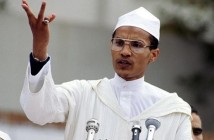By Michael Mainville (AFP) – 10 hours ago
RABAT — Morocco entered the final day of campaigning Thursday for a referendum on curbing the near absolute powers of King Mohammed VI, who has offered reforms in the wake of pro-democracy uprisings in the Arab world.
Faced with protests modelled on the Arab Spring uprisings that ousted long-serving leaders in Tunisia and Egypt, Mohammed VI announced the referendum this month to devolve some of his wide-ranging powers to the prime minister and parliament.
Under a new draft constitution to be voted on Friday, the king would remain head of state, the military, and the Islamic faith in Morocco, but the prime minister, chosen from the largest party elected to parliament, would take over as head of the government.
Mohammed VI, who in 1999 took over the Arab world’s longest-serving dynasty, offered the reforms after the youth-based February 20 Movement organised weeks of pro-reform protests that brought thousands to the streets.
The reforms fall short of the full constitutional monarchy many protesters were demanding and the movement has urged its supporters to boycott Friday’s vote.
The reform plan has been hailed abroad, however, with the European Union saying it “signals a clear commitment to democracy”.
The country’s three biggest political parties — the Justice and Development Party, an Islamist formation; the Socialist Union of Popular Forces (USFP); and the conservative Istiqlal party — have also urged their supporters to vote “yes”.
The February 20 movement has continued to hold protests, organised through websites such as Facebook and YouTube, since the reforms were announced and maintains they do not go far enough.
The movement has already called another demonstration for Sunday.
Analysts say there is little doubt the new constitution will be approved and the brief referendum campaign has been dominated by the “yes” side, with few signs of an organised “no” vote movement.
Thousands of supporters also took to the streets in major cities including Rabat and Casablanca on Sunday to back the reforms.
Along with changes granting the prime minister more executive authority, the new constitution would reinforce the independence of the judiciary and enlarge parliament’s role.
It would also remove a reference to the king as “sacred”, though he would remain “Commander of the Faithful” and it would say that “the integrity of the person of the king should not be violated.”
The new constitution would also make Berber an official language along with Arabic — the first time a North African country has granted official status to the region’s indigenous language. According to the 2004 census, 8.4 million of Morocco’s 31.5 million people speak one of the three main Berber dialects.
Related articles
- Comment: Doubts remain over Morocco
Financial Times – 2 days ago - Constitutional reforms spark debate in Morocco
GlobalPost – 1 day ago - Moroccans protest for and against new constitution
San Francisco Chronicle – 3 days ago - More coverage (1) »
[googleapps domain=”www” dir=”hostednews/afp/article/ALeqM5jJD-zMlzyWH81L6uPACgMHKec3Nw” query=”docId=CNG.353c3f251cb59a61d79f44b103256a6c.01″ width=”320″ height=”240″ /]






